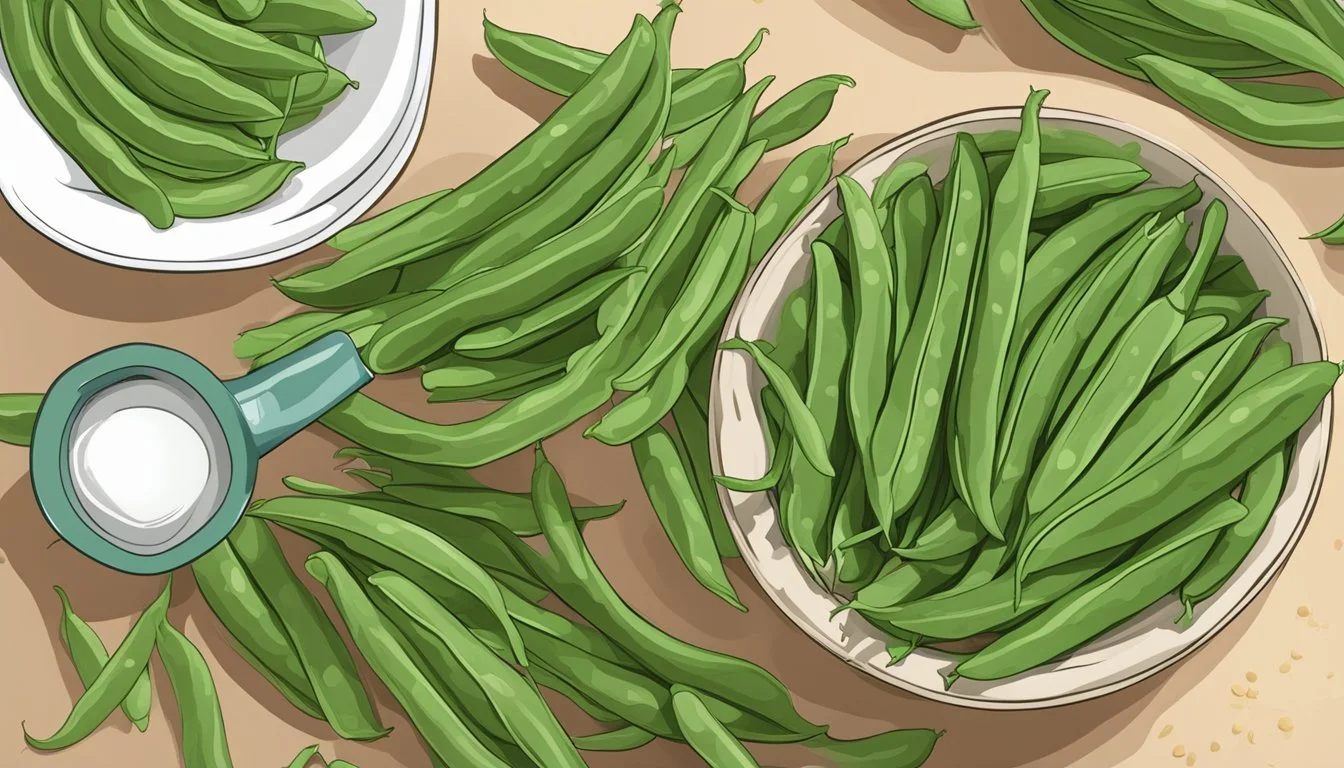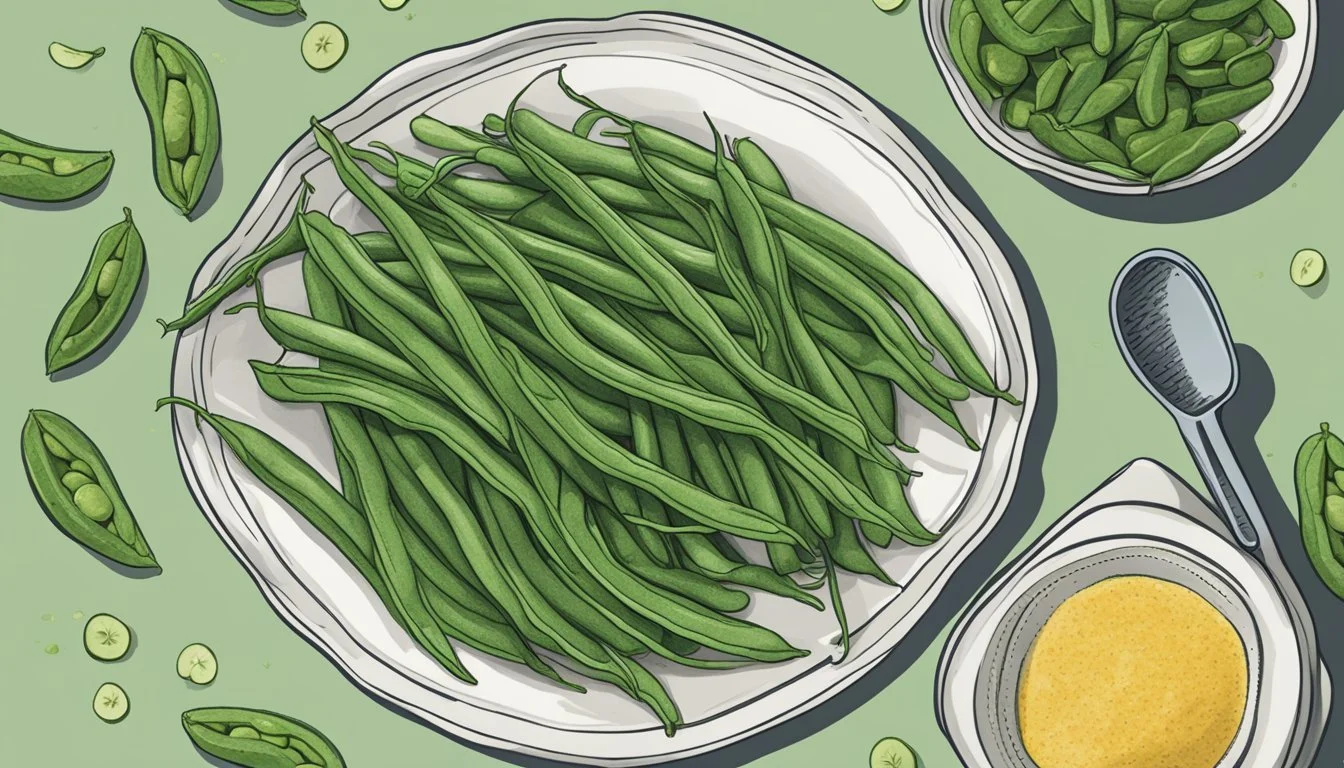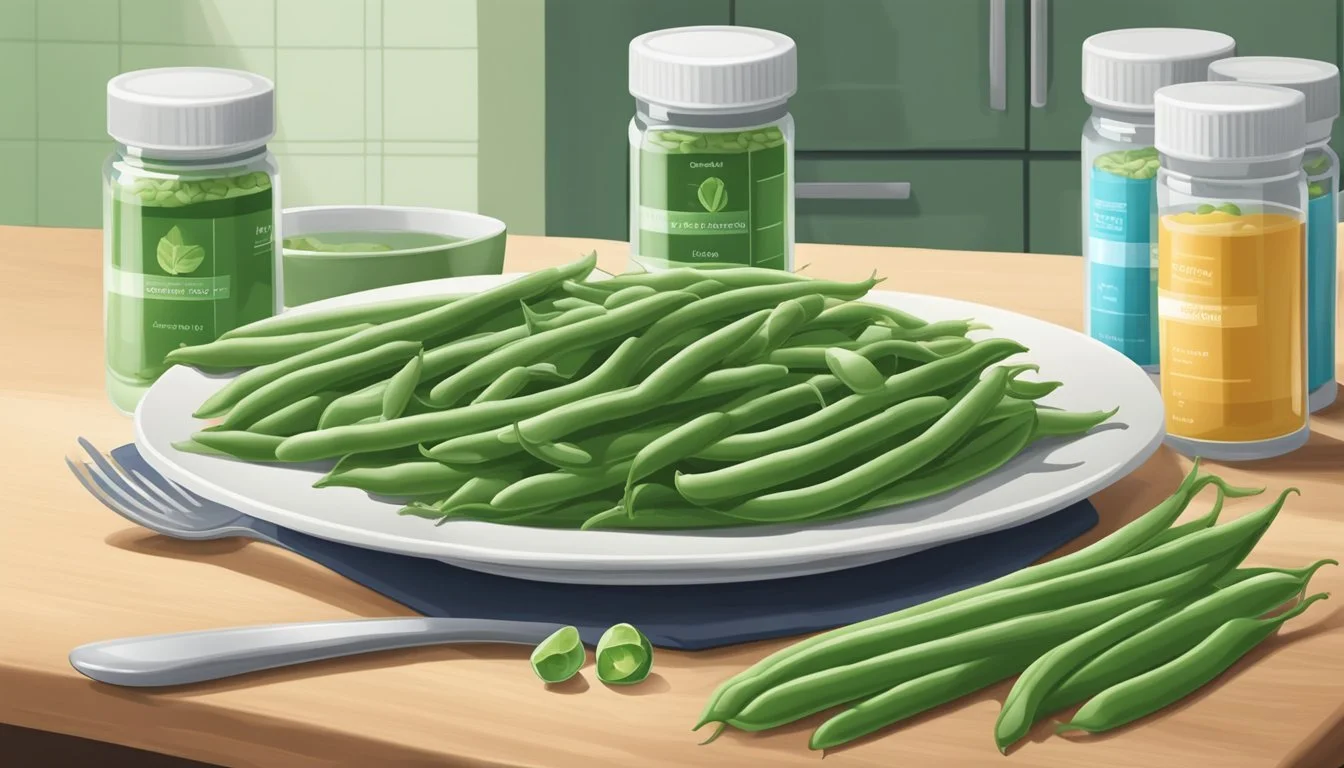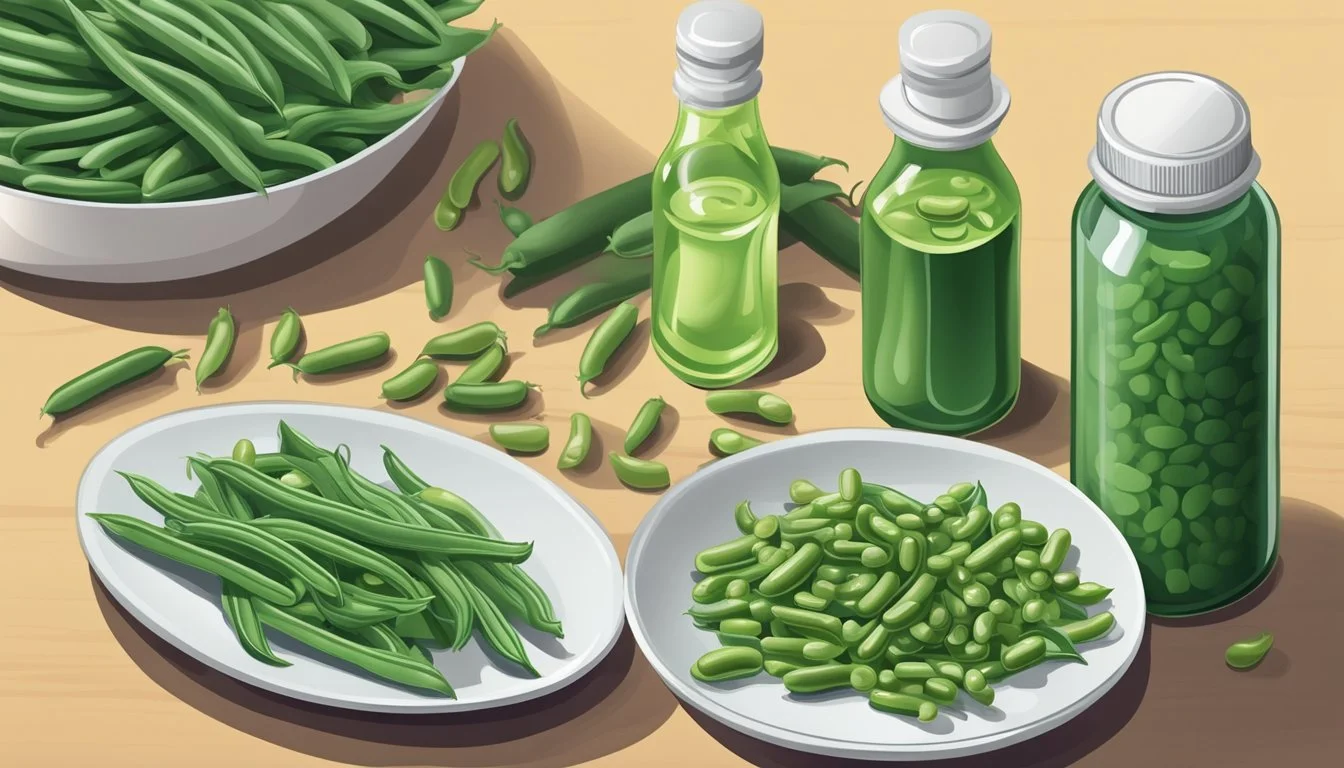How Many Cups of Green Beans Equal Your Daily Vitamin K Intake?
Vitamin K plays a crucial role in blood clotting and bone health, and incorporating adequate amounts of this essential nutrient into the diet is important for overall well-being. Green beans are among the various vegetables that contribute to the daily intake of vitamin K. They are a versatile and widely consumed vegetable that not only provides a good source of this vitamin but also offers other nutritional benefits with minimal calories.
Determining the amount of green beans one should consume to meet the recommended vitamin K intake depends on various factors, including age, gender, and individual dietary requirements. On average, one cup of green beans contains about 14.4 micrograms of vitamin K, which contributes to almost 20 percent of the daily requirement for most adults. This percentage can also vary depending on the method of preparation and the freshness of the beans.
Considering the nutritional significance of green beans, integrating them into one's diet can be an effective strategy to ensure sufficient vitamin K consumption. They can be enjoyed in many forms, from steamed or boiled as a side dish to being included in salads, soups, and casseroles, thus making them a practical addition to daily meals for maintaining vitamin K levels.
Understanding Vitamin K
Vitamin K is an essential nutrient that plays a crucial role in maintaining several bodily functions, particularly in blood clotting and bone health.
Roles and Benefits
Vitamin K is essential for synthesizing proteins that are required for blood clotting, which prevents excessive bleeding. Without sufficient vitamin K, the blood would not clot properly, leading to an increased risk of hemorrhage. Beyond its pivotal role in hemostasis, vitamin K is also vital for bone health. It supports the regulation of calcium in the bones and blood, with studies suggesting a link between adequate vitamin K intake and a lower risk of bone fractures.
Vitamin K is also associated with heart health. It is believed to help prevent the calcification of arteries, a factor that can lead to atherosclerosis, which in turn can increase blood pressure and the risk of heart-related diseases.
Vitamin K Varieties
There are two primary forms of vitamin K: vitamin K1 and vitamin K2.
Vitamin K1: Also known as phylloquinone, it is predominantly found in plant-based foods, especially green leafy vegetables. It is the most common form of vitamin K consumed in the diet.
Vitamin K2: Also known as menaquinone, it is present in animal-based and fermented foods. (What wine goes well with fermented foods?) Vitamin K2 is synthesized by the bacteria in the human gut and is also available through dietary sources.
Both forms of vitamin K are fat-soluble vitamins, meaning they are best absorbed by the body when consumed with dietary fat. It's crucial for individuals on anticoagulant medications to manage their vitamin K intake carefully, as it can affect the efficacy of these medications.
Nutritional Profile of Green Beans
Green beans, known for their rich nutrient content, offer a range of vitamins and minerals, with a particular emphasis on Vitamin K, which plays a pivotal role in blood clotting and bone health.
Vitamin K Content in Green Beans
Green beans are an excellent source of Vitamin K. One cup of raw green beans contains approximately 14.4 micrograms of Vitamin K, which contributes to the recommended daily intake for adults—90 micrograms for females and 120 micrograms for males. Cooking green beans slightly increases their Vitamin K content, with a cup of cooked green beans providing around 20 micrograms.
Comparing Fresh, Frozen, and Canned Green Beans
In terms of nutrition, fresh, frozen, and canned green beans vary:
Fresh Green Beans: One cup offers about 31 calories, 1.8g of protein, 7g of carbohydrates, which includes 2.7g of fiber, and a minimal 0.2g of fat. They deliver a wealth of minerals and a significant amount of Vitamin K.
Frozen Green Beans: Typically similar in nutritional value to fresh green beans, as freezing preserves most nutrients, including Vitamin K content. They provide a convenient alternative without significant nutrient loss.
Canned Green Beans: May contain slightly less Vitamin K compared to fresh and frozen varieties due to the canning process. However, they still contribute to the overall intake of this essential nutrient. Canned varieties may also come with added salt, affecting their overall mineral content.
It's important for consumers to be mindful of the form of green beans they choose, considering the potential impact on nutrient density, including Vitamin K and other essential components such as fiber, protein, and carbohydrates.
Dietary Recommendations for Vitamin K
Vitamin K is crucial for blood clotting and maintaining healthy bones. A balanced intake of this fat-soluble vitamin is essential for optimal health, with specific daily requirements for men and women.
Vitamin K Intake for Men and Women
The current Recommended Daily Allowance (RDA) for Vitamin K varies by gender. Men are advised to consume 120 micrograms, while women should aim for 90 micrograms daily. These values are established by experts such as registered dietitians and are supported by the USDA.
Foods high in Vitamin K include:
Leafy greens like spinach and collard greens
Vegetables such as broccoli and Brussels sprouts
Fish, meat, eggs, and cereals (in smaller amounts)
Here is a breakdown of two key leafy greens and their Vitamin K content:
Food Item Vitamin K Content per Cup Spinach, cooked 885 micrograms Collard greens, cooked 530 micrograms
One cup of cooked spinach significantly exceeds the daily requirement for both men and women. Collard greens also provide a robust amount that surpasses the daily needs.
Influence of Diet on Vitamin K Absorption
The absorption of Vitamin K is influenced by the presence of fat in the diet. Including a source of fat can enhance the vitamin's uptake by the body. For instance, a simple addition of olive oil to leafy greens can aid in absorbing this essential nutrient. This is because Vitamin K is fat-soluble and requires dietary fats for optimal absorption.
Consistency in dietary intake of Vitamin K is also important, especially for individuals taking anticoagulants like warfarin, to maintain stable blood clotting function. Regular monitoring by a healthcare professional is essential to ensure that the intake of Vitamin K-rich foods does not interfere with medication efficacy.
Green Beans in the Diet
Green beans are an excellent addition to a balanced diet, providing essential nutrients such as Vitamin A, Vitamin C, and iron. They are a versatile vegetable that can contribute significantly to daily nutrient intake, particularly Vitamin K.
Incorporating Green Beans Into Meals
Green beans can be added to an array of dishes, enhancing flavor and increasing the nutritional profile of meals.
Salads:
Toss raw or blanched green beans into a salad for added crunch and nutrients.
Combine with mixed greens, cherry tomatoes, and a vinaigrette dressing for a nutritious side dish.
Main Dishes:
Stir-fry green beans with protein sources like chicken or tofu and other vegetables for a hearty meal.
Include green beans in casseroles or pasta dishes to boost vegetable intake.
Side Dishes:
Steam or boil green beans and season with herbs and spices for a simple side.
Roast green beans with garlic and a sprinkle of parmesan cheese for a flavorful option.
Balancing Nutrient Intake with Green Beans
Green beans are a nutrient-rich food that supports a balanced diet when consumed as part of varied meals.
Key Nutrients:
Vitamin K: Essential for blood clotting and bone health.
Vitamin A: Important for vision and immune function.
Vitamin C: Supports skin health and immune system.
Iron: Crucial for the formation of red blood cells and oxygen transport.
To ensure a balanced diet, it is important to enjoy green beans alongside other colorful fruits and vegetables, whole grains, lean proteins, and healthy fats. The diversity of foods will cover a broad spectrum of nutrients, contributing to overall health and well-being.
Interactions with Medication
When discussing dietary sources of vitamin K such as green beans, it's imperative to consider their impact on certain medications. In particular, blood-thinning medications such as warfarin, also known as Coumadin, interact with vitamin K.
Green Beans and Blood-Thinning Medication
Green beans contain vitamin K, which plays a crucial role in blood clotting. Patients on blood thinners like warfarin must manage their vitamin K intake with care. Warfarin works by inhibiting the action of vitamin K to prevent unwanted blood clots. Therefore, it is important for individuals on such medication to maintain a consistent level of vitamin K in their diet to ensure the medication's effectiveness.
Recommended Green Bean Intake for Individuals on Warfarin:
Consistency is key: Aim to consume the same amount of green beans (and other vitamin K-rich foods) daily.
Sudden increases/decreases in consumption can alter warfarin's effectiveness.
Interactions at a Glance:
Entity Interaction with Warfarin Vitamin K Can decrease the drug's efficacy if quantities in the diet are inconsistent. Green Beans Contains vitamin K, which can affect warfarin. Amount should remain consistent when consumed.
It is not necessary to avoid green beans or other vitamin K-rich foods altogether while taking warfarin, but the consistency of their intake is essential to maintain medication balance. Patients should always discuss their diet and its potential interactions with their healthcare provider, especially when prescribed blood-thinning medications.
Other Foods High in Vitamin K
Adequate vitamin K intake is crucial for blood clotting and bone health. Besides green beans, several other foods offer significant amounts of this essential nutrient.
Leafy Greens and Cruciferous Vegetables
Leafy greens are a powerhouse when it comes to vitamin K. For instance, kale is widely recognized for its high vitamin K content; just a half-cup of cooked kale provides over 400% of the daily value (DV). Similarly, collard greens are rich in vitamin K, offering 644% of the DV in a one-cup serving. Moreover, cruciferous vegetables like broccoli are not only packed with vitamin K but also deliver a range of other valuable nutrients.
Kale (cooked): 1/2 cup - 443% DV
Collard Greens: 1 cup - 644% DV
Broccoli (cooked): 1/2 cup - 138% DV
Fruits and Vegetables Rich in Vitamin K
Beyond leafy vegetables, certain fruits and other vegetables are excellent sources of vitamin K. Blueberries are both a tasty and nutritious option that contains vitamin K, which can be easily integrated into one's diet. Vegetables like carrots and pumpkin not only add color to your plate but also contribute to the daily intake of vitamin K.
Blueberries: 1/2 cup - 14% DV
Carrot (raw): 1 medium - 8% DV
Pumpkin (cooked): 1 cup - 20% DV
Other than fruits and vegetables, oils such as olive oil serve as a healthy fat and a provider of vitamin K. Additionally, fermented foods and soybeans, commonly found in eastern diets, are known for their vitamin K content, which contributes to their numerous health benefits.
Health Considerations and Vitamin K
Vitamin K is essential for maintaining good health, primarily due to its role in bone health, blood pressure regulation, and pregnancy. It interacts with calcium, magnesium, and potassium to support these functions, and a well-balanced diet rich in vitamin K can help prevent certain health conditions.
Bone Health and Fracture Prevention
Vitamin K is crucial for healthy bones and the prevention of fractures. It aids in the activation of proteins that bind calcium, an important mineral for bone density. A diet sufficient in vitamin K can help prevent osteoporosis and reduce the risk of bone fractures.
Daily intake: Adults should aim for about 90-120 micrograms of vitamin K per day.
Green beans: One cup of cooked green beans contains about 20 micrograms of vitamin K.
Vitamin K's Role in Managing Hypertension
Vitamin K may help manage hypertension, or high blood pressure, which is a significant risk factor for heart health. It works alongside minerals like magnesium and potassium to support blood vessel health and maintain optimal blood pressure levels.
Antioxidants: Green beans are rich in antioxidants, which can help protect blood vessels from damage.
Potassium content: A diet high in potassium from foods like green beans can help lower blood pressure.
Vitamin K for Pregnant Women
For pregnant women, vitamin K is vital for fetal development. It plays a significant role in the development of the fetus's bone structure and can help prevent developmental abnormalities.
Calcium needs: Pregnant women need more calcium, and vitamin K is essential for its proper utilization.
Dietary sources: Aside from green beans, other good sources of vitamin K include leafy greens and certain fruits.
In summary, consuming green beans can contribute to the recommended daily intake of vitamin K, supporting bone health, cardiovascular function, and fetal development.
Supplementing Vitamin K
When considering supplementing vitamin K, it is firstly important to understand that it is an essential vitamin, primarily involved in blood clotting and bone health. While green beans and other leafy greens are natural sources, not everyone may be able to consume the adequate amounts necessary through diet alone.
Dosages of Vitamin K Supplements
Infants (0-12 months): The recommended intake for infants is 2-2.5 micrograms (mcg) per day.
Children (1-18 years): The dosage ranges from 30-75 mcg per day, depending on age.
Adults:
Women (19 and older): 90 mcg/day
Men (19 and older): 120 mcg/day
These dosages are often enough to meet the requirements of individuals with a normal diet.
Choosing a Vitamin K Supplement
When selecting a supplement, patrons should seek products that:
Are manufactured by reputable companies that adhere to good quality standards.
Clearly state the type of vitamin K provided (e.g., K1 or K2).
Do not exceed the recommended daily allowance to avoid potential side effects.
Supplements are available in various forms such as tablets, capsules, and even liquid drops. Before supplementing, one should consult a healthcare provider, as vitamin K can interact with certain medications, especially blood thinners. They can help determine if a supplement is necessary and advise on the correct dosage.









